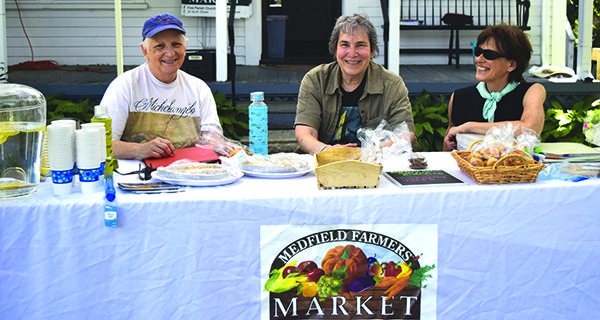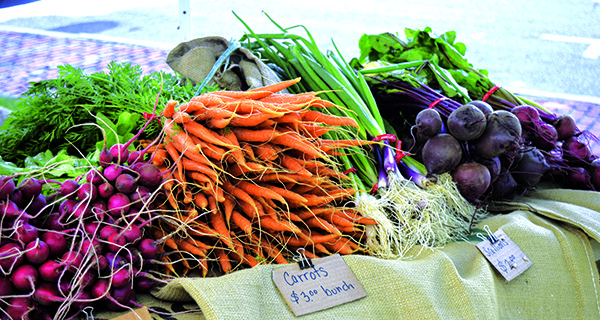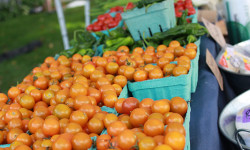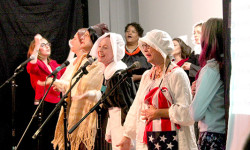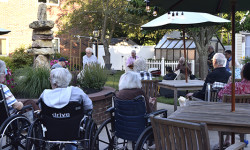[ccfic caption-text format="plaintext"]
Christina Perrone
Hometown Weekly Intern
The Medfield Farmers’ Market has been a summer staple for seven years. Vendors from all around the Boston Area congregate every Thursday in front of the Unitarian Universalist Church. On Thursday, June 22, Hometown Weekly stopped by to talk to local farmers and artisans.
At one stand was Tony Lulek. In a typical day, Lulek will mount his own beehives. “I have 15 hives in and around this area, in Sherborn and in Holliston, where I’m based,” he said. “This is what I do for a living. I’m a full time beekeeper … My last three days have been outside in the fields with the bees, and then I’ll be doing the Farmers’ Market today, Saturday, and Sunday.”
Almost every business present at the market relies heavily on bees. Unfortunately, a recent phenomenon called Colony Collapse Disorder has cut down the bee population dramatically over the past few years. “It’s a complicated issue,” said Lulek. “The biggest problem that I see is backyard people spraying pesticides all over their lawns. That’s the biggest part of this problem … Because the bees are going to backyards for bee-friendly plants, and they’re tainted with all the chemicals people put in their backyard. So that’s a big deal.” Many farmers at the market abstain from using any pesticides in order to combat this issue and save the bees.
The level of passion and dedication at the market place was contagious. Shawn Heide, who manned a Jamaican food bar, was no exception. “I went to school in New York and kind of fell in love with Jamaican food,” he reminisced. “Then I actually learned how to make Jamaican food from a bunch of Jamaican women. It was a lot of fun, and then I lived in the West Indies for several months to travel around and I got to taste a lot of jerk. So I thought I’d bring it back to Boston.” The jerk bar was founded by Heide and his brother, who both grew up in Medfield. The bar is a pop-up that travels to farmers’ markets in the Boston area. The smell of simmering jerk chicken and sauces attracted a rather large fan base as the day went on.Bill Hathaway and his daughter, meanwhile, held the fort down at their seafood stand. “We go out to the docks of Boston every day, every morning. Most of it’s local. The cod is from Scituate, the grey sole is from Gloucester, the scallops are from Chatham,” he said, while grabbing a fish from the truck for a customer. “This is a family run business, it’s been going on for more than thirty years.”
There is also a tremendous sense of history at the stand. Long ago, the United States transitioned from an agricultural society to an industrialized one. As a result, some ancient practices have been forgotten.
Karen Marshall brought with her jars of pickles and preserved crops. She has been preserving things for 22 years and hopes to continue the tradition. “I’m half American Indian, so my grandparents did it, my great grandparents did it,” she said, “so it’s kind of down the lineage, and now I’m teaching my youngest how to pickle.” Marshall heralds from the Abenaki nation in Vermont. Any form of food preservation, be it pickling or canning, is considered to be Native American. “I do have my grandparents’ cookbook, so I have some of their recipes, but I’ve modernized them,” said Marshall. “Because back then, everything was hanged upside down to dry the roots out … well, no one has root cellars any more, so I use a dehydrator now,” she said laughing. Marshall’s favorite type of pickle is the spicy dill.
Christy Kantlehner also came to the farmers’ market with a lovely arrangement of the various crops and flowers grown at her farm in Wrentham. Christy and her husband, Chris, have been running the farm for nine years. According to Kantlehner, one of the most rewarding parts of growing her own crops – besides eating them – is seeing all of the life the crops support.
“You know what I get a kick out of? Seeing all the different kinds of insects, or toads, or the different things that can live in the habitat that we provide by growing vegetables in the middle of suburbia,” she said. “So like today, I saw this special little wasp carrying away one of the bugs that I hate, the tarnished plant bug. It just makes me happy that we don’t spray any pesticides.
“Another thing that I feel strongly about is open space,” she said as she adjusted some nasturtiums. “So every abutting piece of property has become housing development. I grow [on] my family land where my grandmother was born in the house, and her mother was born in the house. My grandmother is 95.” Her advice to those who want to start their own farm is to “start small” and to “try to assess your crops and your markets and your efficiency as you go.”
The Farmers’ Market would not be possible this year without the help of Susan Stromgren, a Medfield resident. “This is my first year of managing the Farmers’ Market. So it’s a new thing for me,” she said. “We have so much great local talent. And the vegetables … are so pristine. It’s as if they take each one from the garden, dust it off, send it through the washer, brought them here and set them up as beautifully as they do. It’s pretty terrific.”
Stromgren is instrumental in choosing vendors for the Farmers’ Market. “I try to track down the ones that I think will be just perfect for our smallish market. And then try to keep new ones coming in. So we have about 15 committed vendors right now, but I’ve got lists of people to call,” said Stromgren.
There are lots of activities for kids to do while parents shop. One such activity was painting pots and filling them with soil and composted coffee grounds. “The kids love this stuff,” said Stromgren referring to the coffee grounds. “It repels ants and slugs too.”
In the coming months, Stromgren has a lot of ideas for the market place: “All throughout the summer, we’ll have new things … I am going to try to make a Medfield-wide pie baking contest, because everybody says: ‘Oh, my Aunt Louise makes the best pies.’ So I said: ‘Bring your best pie.’ Then I have to figure out who’s going to judge these things. I’m figuring I’ll ask the local chefs, and then, of course, our pastor will have to be part of that,” she chuckled.
Stromgren lived in Medfield for nearly nine years. “I love that fact that it’s small enough so that I can go [anywhere] and see people I know all the time” she said smiling, “It gets bigger every year … and we have more people, but it still retains the small town feel. Which is why I moved out here from Cambridge.”
After the tech company Stromgren worked for went bust, she faced a hard decision. “I had to reinvent myself. But, you know, more often, when we feel like the carpet is pulled out from under us, we find out that we’re standing on a magic carpet, because it takes us places that we don’t expect. And this is where I ended up,” she waved around at the Farmers’ Market.
“I’m so much happier doing this, and I have a dog care business so I’m outside and walking all the time,” she said. “I feel healthier and more grounded than I ever felt working for a corporation.” She then added humorously, “and I’m making twice as much money!”
Stromgren made the hard choice to take the path less travelled instead of the safety of a big corporation, and it has paid off in the long run. “I was brought up thinking that you have to work for a big corporation and you have to get all the benefits, put all your money in a 401K and buy an expensive car – but that never resonated with me, so when the company went bust, I went, ‘Okay. I’ve got maybe $20,000 to work with while I figure out what I want to do,’ so I did that. And never looked back,” said Stromgren.
When she started working for herself, Stromgren discovered, “You have to figure out what’s important for your life, and to get up in the morning and feel happy about every day, that to me is success … And it’s taken me about 55 years to figure that out.”
This is Stromgren’s first year working as the manager for the Medfield Farmer’s Market.
“I can tell now that I love this. I love doing this and as long as I have help,” Stromgren gestured to her friends at the main stand, “I can do this every summer.”





